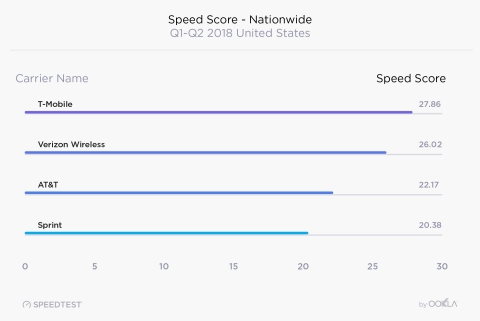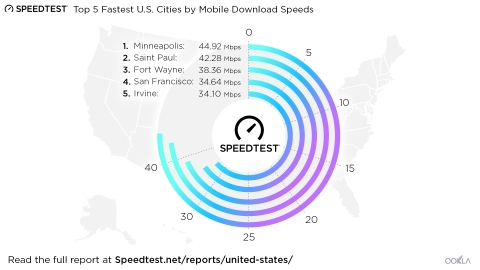SEATTLE--(BUSINESS WIRE)--Ookla, the global leader in mobile and broadband network testing, data and analysis, today released their annual U.S. Mobile Performance Report. The report reveals the definitive ranking of cities with the fastest and slowest mobile internet, as well as which carrier is fastest in each city. Minneapolis tops the list of fastest cities. T-Mobile takes the top slot of fastest carrier in the country, but in the metropolitan hotspots Verizon reigns supreme as the fastest carrier in the most number of cities analyzed. AT&T and Sprint round out the ranking in third and fourth, respectively.
“In the global economy, mobile network performance can mean success or failure,” said Ookla General Manager and Cofounder Doug Suttles. “It’s critical that this country continues to make advancements in connectivity – particularly in 5G – and we can see just where our achievements and gaps lay in this data.”
The company analyzed test results taken on their flagship application, Speedtest, in Q1 and Q2 of this year. During this period, 2,841,471 unique mobile devices were used to perform over 12 million consumer-initiated cellular network tests on Speedtest mobile applications. When analyzing fastest carriers, Ookla considers all carriers with 3% or more of total test samples in the market for the period. Fastest carrier is determined using a proprietary Speed Score, which incorporates a measure of each carrier’s download and upload speed to rank network speed performance.
The analysis also compares this year’s city rankings and carrier speeds with those outlined in last year’s report (from Q1-Q2 2017). This juxtaposed data demonstrated the impact of network investments such as 5G and showcased improvements for some cities and carriers, while outing others in need of serious improvement if they’re to compete nationally.
“This is where the data becomes truly captivating with far-reaching implications in today’s mobile-centric world,” said Suttles. “It’s no question that the carrier market is tightly crowded, but by looking at these cities, you can see where there is ground to be made and competitor margins narrowed. Elsewhere, governments can make infrastructure investments, businesses can decide office locations, and consumers can understand the speeds at play in cities they may consider living or working.”
While you may expect a bustling coastal city or carrier’s headquarters to take first prize for fastest city out of the 100 studied (by population), it was Minneapolis that was awarded the title thanks to having the fastest mean download speed over mobile. This year, the twin cities edged out Fort Wayne to take the number one and two spots, followed by San Francisco and Irvine surpassing Atlanta and Pittsburg in the fourth and fifth place spots.
It’s in these populated cities that Verizon closes its gap with T-Mobile, having come in first in 45 of the 100 cities and Washington, DC, whereas T-Mobile won 33, AT&T 12 and Sprint five.
Rounding out the tail-end of the country’s top 100 were this year’s slowest cities: Laredo, Anchorage, Madison, Reno, and Lubbock. Interestingly, however, the fastest carrier ranking in these rural cities closely resembled the national ranking, with T-Mobile taking the top spot and Sprint being the slowest. The more rural areas of the country unsurprisingly suffer the most, as is often a point raised in national conversation due to the wider economic implications. And, the data indicates that consumers in these areas may find themselves having to choose between speed and coverage.
“We’re seeing unprecedented change in this country’s – and the world’s – approach to mobile,” said Suttles. “As we have in years past, we can see the impacts shaping consumers’ mobile experience and, given the prevalence of the devices in our day-to-day lives, these impacts do not go unnoticed. With the race to 5G, ongoing legislative debate around network neutrality, and the landmark mergers of Sprint and T-Mobile and AT&T and Time Warner, the evolution in the consumer’s experience (and its extracted data) over the next few years will be fascinating.”
Speedtest is unique in that it provides the closest reflection of the internet experience people have in their daily lives and the way networks are performing for their users. With 10 million tests taken by real people every day, insights based on Speedtest data provide a comprehensive and accurate view of internet performance and accessibility. Additionally, the Speedtest testing server network is the largest in the world, which ensures that test results always reflect maximum available speeds for the actual location where the test is being taken.
Additional Resources
Read the full report on the Speedtest website: https://www.speedtest.net/reports/united-states
About Ookla
Ookla®, the company behind Speedtest®, is the global leader in fixed broadband and mobile network testing applications, data and analysis. Over ten million tests are actively initiated by consumers each day across all Speedtest platforms, with more than 20 billion completed to date. As a result, Ookla has the most comprehensive analytics on worldwide internet performance and accessibility. Ookla transforms these billions of real-world tests into vital research tools. The company’s flagship enterprise product, Speedtest Intelligence®, is used by ISPs, carriers, businesses, universities and government agencies alike who trust Ookla’s commitment to quality and neutrality. Ookla’s headquarters are located in Seattle, WA with additional offices in Memphis, TN and Dublin, Ireland.



